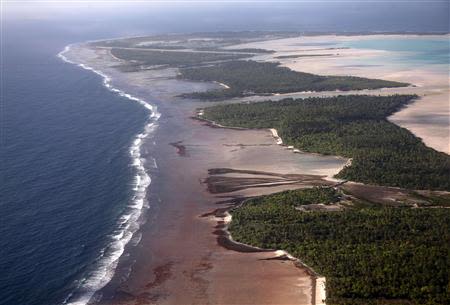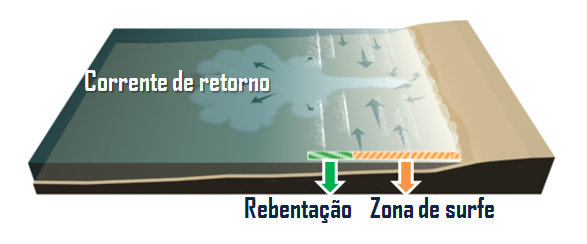Tide of humanity, as well as rising seas, lap at Kiribati's future
By David Gray


SOUTH TARAWA, Kiribati (Reuters) - The ocean laps against a protective seawall outside the maternity ward at Kiribati's Nawerewere Hospital, marshalling itself for another assault with the next king tide.
Inside, a basic clinic is crowded with young mothers and newborn babies, the latest additions to a population boom that has risen as relentlessly as the sea in a deeply Christian outpost where family planning is still viewed with skepticism.
It is a boom that threatens to overwhelm the tiny atoll of South Tarawa as quickly as the rising seas. Some 50,000 people, about half of Kiribati's total population, are already crammed onto a sand and coral strip measuring 16 sq km (6 sq miles).
"Climate change is a definite long-term threat to Kiribati, there's no doubt whatsoever about that," says Simon Donner, a climate scientist at the University of British Columbia who has been visiting South Tarawa since 2005.
"But that doesn't mean it's the biggest problem right now ... Any first-time visitor to Tarawa is not struck by the impacts of sea level rise, they're struck by how crowded it is."
Low-lying South Pacific island nations such as Kiribati (pronounced Kee-ree-bahs) and Tuvalu, about halfway between northeast Australia and Hawaii, have long been the cause célèbre for climate change and rising sea levels.
Straddling the equator and spread over 3.5 million sq km (2 million sq miles) of otherwise empty ocean, Kiribati's 32 atolls and one raised coral island have an average height above sea level of just two meters (6-1/2 feet).
Studies show surrounding sea levels rising at about 2.9 mm a year, well above the global average of 1 - 2 mm a year.
Kiribati President Anote Tong has grimly predicted his country will likely become uninhabitable in 30-60 years because of inundation and contamination of its fresh water supplies.
OVERCROWDING "A MENACE"
While climate change poses a serious longer-term threat, many people, including Tong, recognize that breakneck population growth is a more immediate problem. South Tarawa' population density of more than 3,000 per sq km is comparable to Los Angeles or parts of London - without the high rises.
The government fears South Tarawa's population could double to more than 100,000 by 2030 unless the birth rate and internal migration slows.
Rudimentary huts of little more than timber sleeping platforms and palm thatch roofs line a single dusty road running the length of the atoll. Dotted among them are pig pens, chicken coops, overcrowded grave sites and the blasted relics from one of the bloodiest battles of World War Two.
Bwabwa Oten, Kiribati's director of hospital services, says current annual population growth in Kiribati is close to 6 percent, with overcrowding a major contributor to disease and an infant mortality rate among the highest in the region.
The church plays an integral role in the South Pacific and efforts to limit birth rates have run into resistance. Large families are also traditional in the region, which has one of the world's highest rates of teen pregnancy.
Describing the population surge as "a menace", Tong has called on churches to help curb growth by allowing their members to use birth control.
"Religion is incredibly powerful in the Pacific and there is quite an overt suspicion that, when we are talking about family planning, it in fact means family stopping," said Bronwyn Hale of New Zealand-based Family Planning International, which is working to promote sexual and reproductive health in Kiribati.
Progress is being made, with clinic visitor numbers up and a growing acceptance of the threat of over-population.
"Right now, population is the major issue, the number one issue we should face," said Peter Itibita, a member of the Mormon Church in South Tarawa.
Many health problems also stem from a lack of clean water as rising salinity and pollution affect underground water, with diarrhea outbreaks caused by contamination from human and animal waste and other pollutants.
Nawerewere Hospital also has problems, with new mothers spilling from overcrowded wards onto verandas and into corridors.
"Sometimes with the new babies, we don't have the water to wash them," says Rina Tabi, a maternity ward nurse.
Plans are underway for solar-powered energy and desalination plants but the cost of building and maintaining them is a challenge for cash-strapped Kiribati, which relies on aid and royalties from foreign fishing fleets.
COPING MECHANISMS "OVERWHELMED"
The complexities of sea level change are becoming more apparent and there is little doubt that nations like Kiribati will be among the most affected. But it is equally clear that vulnerable states like Kiribati are responsible for less than 0.1 percent of global emissions of greenhouse gases from burning fossil fuels.
According to the United Nations, population growth in the Pacific has consistently exceeded all other regions except Africa for the past 30 years and is likely to remain higher than the global average for the next 40-50 years, even though barely 10 million people are dotted across the world's biggest ocean.
There is also a history of concern about Pacific over-crowding, with dire predictions of population growth outstripping food production dating back to the 1960s.
Barry Coates, executive director of Oxfam New Zealand, said populations of fragile atolls had long-developed resilience in dealing with resource shortages, cyclones and other periodic climatic events.
"But what is happening now is that the pressures of population growth and climate change are overwhelming the traditional coping mechanisms," Coates said.
The Kiribati government has also been looking at radical options for feeding and housing its people, including negotiating to buy land on nearby Fiji.
Larger Pacific neighbors New Zealand and Australia are likely to play a big role if large-scale migration is needed, and Western governments are under pressure to create a new refugee category for those fleeing the effects of climate change. A test case from Kiribati was rejected in New Zealand in 2012 and changes to international law will likely be needed.
(Additional reporting and writing by Lincoln Feast in SYDNEY; Editing by Paul Tait)
Inside, a basic clinic is crowded with young mothers and newborn babies, the latest additions to a population boom that has risen as relentlessly as the sea in a deeply Christian outpost where family planning is still viewed with skepticism.
It is a boom that threatens to overwhelm the tiny atoll of South Tarawa as quickly as the rising seas. Some 50,000 people, about half of Kiribati's total population, are already crammed onto a sand and coral strip measuring 16 sq km (6 sq miles).
"Climate change is a definite long-term threat to Kiribati, there's no doubt whatsoever about that," says Simon Donner, a climate scientist at the University of British Columbia who has been visiting South Tarawa since 2005.
"But that doesn't mean it's the biggest problem right now ... Any first-time visitor to Tarawa is not struck by the impacts of sea level rise, they're struck by how crowded it is."
Low-lying South Pacific island nations such as Kiribati (pronounced Kee-ree-bahs) and Tuvalu, about halfway between northeast Australia and Hawaii, have long been the cause célèbre for climate change and rising sea levels.
Straddling the equator and spread over 3.5 million sq km (2 million sq miles) of otherwise empty ocean, Kiribati's 32 atolls and one raised coral island have an average height above sea level of just two meters (6-1/2 feet).
Studies show surrounding sea levels rising at about 2.9 mm a year, well above the global average of 1 - 2 mm a year.
Kiribati President Anote Tong has grimly predicted his country will likely become uninhabitable in 30-60 years because of inundation and contamination of its fresh water supplies.
OVERCROWDING "A MENACE"
While climate change poses a serious longer-term threat, many people, including Tong, recognize that breakneck population growth is a more immediate problem. South Tarawa' population density of more than 3,000 per sq km is comparable to Los Angeles or parts of London - without the high rises.
The government fears South Tarawa's population could double to more than 100,000 by 2030 unless the birth rate and internal migration slows.
Rudimentary huts of little more than timber sleeping platforms and palm thatch roofs line a single dusty road running the length of the atoll. Dotted among them are pig pens, chicken coops, overcrowded grave sites and the blasted relics from one of the bloodiest battles of World War Two.
Bwabwa Oten, Kiribati's director of hospital services, says current annual population growth in Kiribati is close to 6 percent, with overcrowding a major contributor to disease and an infant mortality rate among the highest in the region.
The church plays an integral role in the South Pacific and efforts to limit birth rates have run into resistance. Large families are also traditional in the region, which has one of the world's highest rates of teen pregnancy.
Describing the population surge as "a menace", Tong has called on churches to help curb growth by allowing their members to use birth control.
"Religion is incredibly powerful in the Pacific and there is quite an overt suspicion that, when we are talking about family planning, it in fact means family stopping," said Bronwyn Hale of New Zealand-based Family Planning International, which is working to promote sexual and reproductive health in Kiribati.
Progress is being made, with clinic visitor numbers up and a growing acceptance of the threat of over-population.
"Right now, population is the major issue, the number one issue we should face," said Peter Itibita, a member of the Mormon Church in South Tarawa.
Many health problems also stem from a lack of clean water as rising salinity and pollution affect underground water, with diarrhea outbreaks caused by contamination from human and animal waste and other pollutants.
Nawerewere Hospital also has problems, with new mothers spilling from overcrowded wards onto verandas and into corridors.
"Sometimes with the new babies, we don't have the water to wash them," says Rina Tabi, a maternity ward nurse.
Plans are underway for solar-powered energy and desalination plants but the cost of building and maintaining them is a challenge for cash-strapped Kiribati, which relies on aid and royalties from foreign fishing fleets.
COPING MECHANISMS "OVERWHELMED"
The complexities of sea level change are becoming more apparent and there is little doubt that nations like Kiribati will be among the most affected. But it is equally clear that vulnerable states like Kiribati are responsible for less than 0.1 percent of global emissions of greenhouse gases from burning fossil fuels.
According to the United Nations, population growth in the Pacific has consistently exceeded all other regions except Africa for the past 30 years and is likely to remain higher than the global average for the next 40-50 years, even though barely 10 million people are dotted across the world's biggest ocean.
There is also a history of concern about Pacific over-crowding, with dire predictions of population growth outstripping food production dating back to the 1960s.
Barry Coates, executive director of Oxfam New Zealand, said populations of fragile atolls had long-developed resilience in dealing with resource shortages, cyclones and other periodic climatic events.
"But what is happening now is that the pressures of population growth and climate change are overwhelming the traditional coping mechanisms," Coates said.
The Kiribati government has also been looking at radical options for feeding and housing its people, including negotiating to buy land on nearby Fiji.
Larger Pacific neighbors New Zealand and Australia are likely to play a big role if large-scale migration is needed, and Western governments are under pressure to create a new refugee category for those fleeing the effects of climate change. A test case from Kiribati was rejected in New Zealand in 2012 and changes to international law will likely be needed.
(Additional reporting and writing by Lincoln Feast in SYDNEY; Editing by Paul Tait)
http://news.yahoo.com


Comentários
Postar um comentário